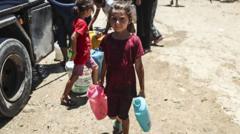Israel's Defense Minister proposes moving Gaza's entire population to a specified camp in Rafah, igniting condemnation from human rights advocates and fears of forced displacement akin to historical events.
Israeli Plans for Gaza Population Relocation Spark Outrage

Israeli Plans for Gaza Population Relocation Spark Outrage
Israeli Defense Minister outlines controversial plan to relocate Gaza's residents as humanitarian efforts clash with accusations of ethnic cleansing.
Israeli Defense Minister Yoav Gallant has reportedly ordered military preparations for a plan to relocate the entire Gazan populace to a designated camp in the southern city of Rafah, according to various Israeli media outlets. The controversial proposal aims to create a "humanitarian city" intended to initially accommodate around 600,000 Palestinians, with plans for eventual resettlement of the entire 2.1 million residents of Gaza.
Gallant emphasized that inhabitants would undergo security screenings to confirm they are not affiliated with Hamas, and once relocated, they would be prohibited from leaving the camp. If conditions allow, he suggested that construction on this facility could begin during a potential 60-day ceasefire currently under discussion between Israel and Hamas.
This scheme has drawn sharp criticism, with prominent Israeli human rights attorney Michael Sfard denouncing it as an "operational plan for a crime against humanity." He highlighted concerns regarding the implied forced transfer of Gazans to the southern region, which could lead to mass deportation outside the Gaza Strip altogether. The United Nations has previously flagged such actions as a breach of international humanitarian law, equating them with ethnic cleansing.
No immediate response from either the Palestinian Authority or Hamas has been reported. Meanwhile, during a recent White House meeting, Israeli Prime Minister Benjamin Netanyahu discussed U.S. President Joe Biden's proposal for a U.S.-led initiative to permanently resettle Gaza's population. Netanyahu expressed enthusiasm for Biden's vision, which allows Palestinians the choice to remain or leave, albeit under sensitive circumstances.
In March, Arab states proposed a $53 billion plan for Gaza's reconstruction that allows for Palestinian residency without relocation, firmly rejecting any form of displacement. This sentiment was echoed by both Hamas and the Palestinian Authority, labeling such actions as significant violations of law and human rights.
Adding to the Palestinian community's anxieties is the historical context of the Nakba, where many were forcibly displaced during the creation of Israel in 1948. Currently, the UN notes that 900,000 Palestinian refugees reside in the occupied West Bank, alongside over 3.4 million others in Jordan, Syria, and Lebanon, reinforcing fears of a similar crisis unfolding once again.
Following an unprovoked cross-border assault on October 7, 2023, which resulted in the deaths of approximately 1,200 individuals and numerous hostages taken, Israel has initiated a military campaign aimed at dismantling Hamas. Since then, more than 57,500 people have reportedly lost their lives in Gaza, with a significant portion of the area now rendered uninhabitable due to ongoing conflict. The humanitarian crisis has reached alarming levels, with over 90% of homes damaged or destroyed and severe shortages in basic necessities such as food, medicine, and clean water.





















